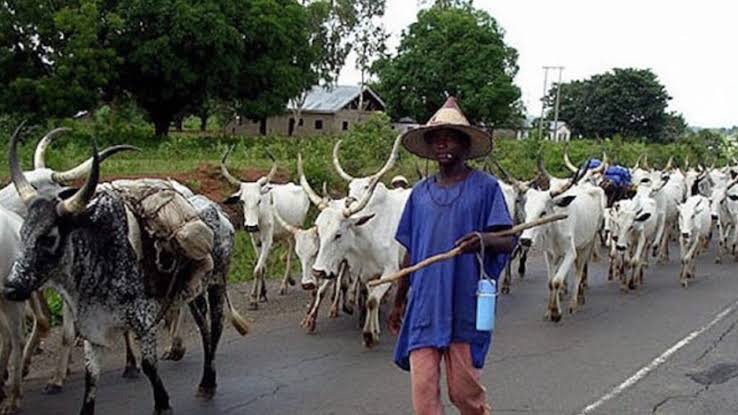Advertisements
The Federal Government has clarified that it has not issued any nationwide ban on open cattle grazing, contrary to widespread reports suggesting that the practice had been outlawed across the country.
Ejes Gist News reports that the clarification followed heightened public debate triggered by media publications claiming the Tinubu administration had approved an outright prohibition of open grazing.
The Minister of Livestock Development, Idi Mukhtar Maiha, issued the clarification through a statement released by the ministry’s Head of Press and Public Relations, Oghenekevwe Uchechukwu. Maiha urged Nigerians to dismiss what he described as incorrect interpretations of the government’s livestock reform agenda.
Advertisements
BREAKING: 24 Kidnapped Schoolgirls in Kebbi Successfully Rescued
He stated that the Federal Government is implementing a phased, carefully planned transition from traditional open grazing to modern, commercially structured ranching systems. According to him, the focus of the administration is on modernization, reform, and long-term sustainability rather than sudden restrictions.
Advertisements
Maiha noted that Nigeria currently has 273 gazetted grazing reserves, covering over 4.5 million hectares, which will serve as the foundation for the transition. Many of these reserves, he said, have suffered years of neglect but remain central to the government’s plan to establish organized livestock hubs equipped with the necessary infrastructure.
“The Federal Government has not announced any national ban on open grazing,” the minister stated. “What we are implementing is a gradual, well-structured transformation that supports pastoralists, enhances productivity, reduces conflicts, and builds a modern livestock ecosystem that works for all stakeholders.”
Reforming a Generational System
For decades, open grazing has been the dominant livestock practice in Nigeria, especially among pastoral communities who migrate long distances in search of pasture. However, the system has increasingly resulted in conflicts between farmers and herders, destruction of farmlands, infiltration by criminal groups, and growing insecurity across several regions.
President Bola Tinubu established the Ministry of Livestock Development in 2024 to address these systemic issues and reposition the sector as a stable, revenue-generating component of the economy. Maiha emphasized that the goal is to provide “viable alternatives” instead of imposing sudden restrictions that could threaten livelihoods or worsen food supply pressures.
Grazing Reserves to Function as Business Zones
The minister explained that gazetted grazing reserves are expected to operate as formal livestock business zones where rearing, processing, and related activities will take place in an organized environment. He said the government is responsible for upgrading the reserves and providing essential services such as water, pasture, veterinary care, security, and access to markets.
He added that open grazing persists largely because functioning alternatives have not been provided for pastoral communities, a gap the ministry is now working to close.
Transition Will Be Gradual, Not Forced
Maiha dismissed concerns suggesting that ranching would be imposed abruptly. He said such assumptions have fueled misinformation and confusion among stakeholders. With an estimated 23 million cattle and millions of pastoral families depending on open grazing, he stressed that a sudden shift is neither practical nor economically sustainable.
“This is not about forcing anyone into ranching,” he said. “It is about creating choices that make economic sense. Open grazing will naturally reduce as ranching becomes more attractive and viable.”
States Remain Central to Implementation
The minister confirmed ongoing discussions with state governments, which control land under the constitution. Several states, particularly in the North, have expressed readiness to partner with the Federal Government to rehabilitate and equip their grazing reserves.
The ministry is also developing incentives for private-sector investment in ranching, livestock processing centers, dairy hubs, and other modern livestock value-chain facilities.
Public Urged to Rely on Official Channels
The Ministry of Livestock Development urged Nigerians, media organizations, and stakeholders to rely on official communication channels for updates. It warned that misreporting sensitive issues such as open grazing could escalate tensions or undermine ongoing reforms.
“The public should disregard false claims about an open grazing ban,” the statement noted. “The administration remains committed to transparency and will communicate policy changes clearly and responsibly.”
Reactions and Wider Implications
Analysts say the clarification became necessary due to the political and ethnic sensitivities surrounding open grazing. Several states—such as Benue, Ekiti, Oyo, Ondo, and Rivers—already enforce anti-open-grazing laws, which remain valid regardless of federal policy direction.
Experts believe the Federal Government’s long-term approach, which emphasizes infrastructure and incentives rather than coercive enforcement, may lead to more sustainable outcomes in the livestock sector.
Government’s Long-Term Vision
Maiha reiterated that the administration’s objective is to build a livestock system that guarantees food security, attracts investment, supports pastoral livelihoods, and minimizes recurring conflicts between farmers and herders.
At the heart of our reform is the need to modernize, not marginalize,” he said. “We want a livestock system that is peaceful, productive, and profitable for everyone.

